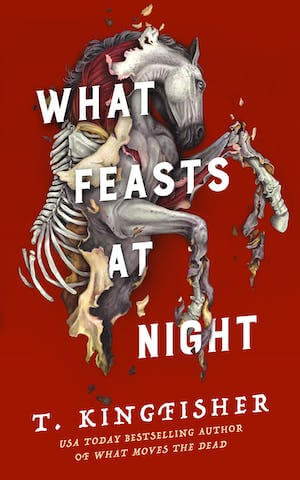“What if he doesn’t get better?”
Angus sighed. “Then he will be like a thousand others in Gallacia this winter. The only difference is that you know his name…”
I’m taking a break this week from my reviews of Books I Really Should Have Read Ages Ago to enjoy a brand new novella by T. Kingfisher. What Feasts At Night features the return of Alex Easton, retired Sworn Soldier of Gallacia who is (apparently) destined to keep running into supernatural events that challenge their whole idea of reality.
Alex is still a little twitchy after the events of the previous book; the entire concept of fungi is something they’d really rather avoid for a while, thank you. However, Miss Potter, the famous British mycologist, was extremely helpful in their adventure at the mansion of the Usher family, and she’s expressed an interest in studying Gallacian mushrooms. Alex’s loyal retainer, the eternally grumpy Angus, also seems to be sweet on Miss Potter, so as a favor to both of them Alex is giving up a pleasant vacation in Paris to spend the autumn at Alex’s hunting lodge in gloomy and cold Gallacia.
One of the reasons Alex became a Gallacian Sworn Soldier in the first place was to be able to travel to places that aren’t Gallacia. A career in the many wars that Gallacians hire themselves out for has pretty much cured Alex of the idea that life as a soldier is an exciting adventure, but it hasn’t changed their opinion of their home country. Gallacia is small, not very picturesque, its people are fairly poor and prone to superstition, and the national wine of Gallacia – livrit – is best avoided.
You really don’t want to drink our wine. We export it because we don’t want to drink it either.
So when Alex and Angus arrive at the hunting lodge near the small village of Wolf’s Ear, the fact that everything is abandoned and not very welcoming should feel normal. Except that the caretaker is dead, the caretaker’s daughter doesn’t want to discuss how he died, the townspeople have some theories about the lodge that mean they don’t want to accept a job, and the silence in the woods? Is weird. It’s less “restful” and more “something’s taken away all of the sounds so you’ll never hear it creeping up behind you”.
God, it was so quiet. Somehow I hadn’t noticed that before.
There’s still a lot of the humor here that Kingfisher loves to include in her books: Alex’s constant stream of tongue-in-cheek descriptions of everything wrong with Gallacia, Alex’s one-sided battle with the Widow hired on as the new caretaker (one-sided because Alex doesn’t actually want to argue and the Widow won’t do anything else), Angus and Alex’s horse Hob both putting up with Alex’s moods with long-suffering patience.
This book is a bit more of a slow burn than Alex’s previous story though. Although “burn” doesn’t quite work as a description because the story is colder, mistier, quieter than that. This is an atmospheric story, told in long pauses, unsettled moments, and the slowly growing fear that something isn’t right. Alex’s war history has also left them with very well-entrenched PTSD (“Soldier’s Heart”, as it was called then), so we’ve got a bit of an Unreliable Narrator going on between the fever-dreams, possible supernatural trickery, and flashbacks that are so vivid they aren’t just memories, they’re returning to an actual place.
The war’s still there. I don’t live in it anymore, but it’s right over there, just on the other side of…I don’t know. Something. Maybe the mystic veil that the spiritualists are always going on about, except there’s nothing mystic about it.
And sometimes, for a little while, I slip over into that other place. The war.

If the cover art hasn’t given it away, there are some nightmarish things happening in this story. The slow build-up leads to a mad panic of activity towards the end. The supernatural element that may or may not exist takes place in the spaces between superstition and mundanely awful things that are so common in history that they’re usually greeted with a weary shrug and a “it was a different time”. It’s a little too dark for a children’s story, but it does end on a perfect fairy-tale line.